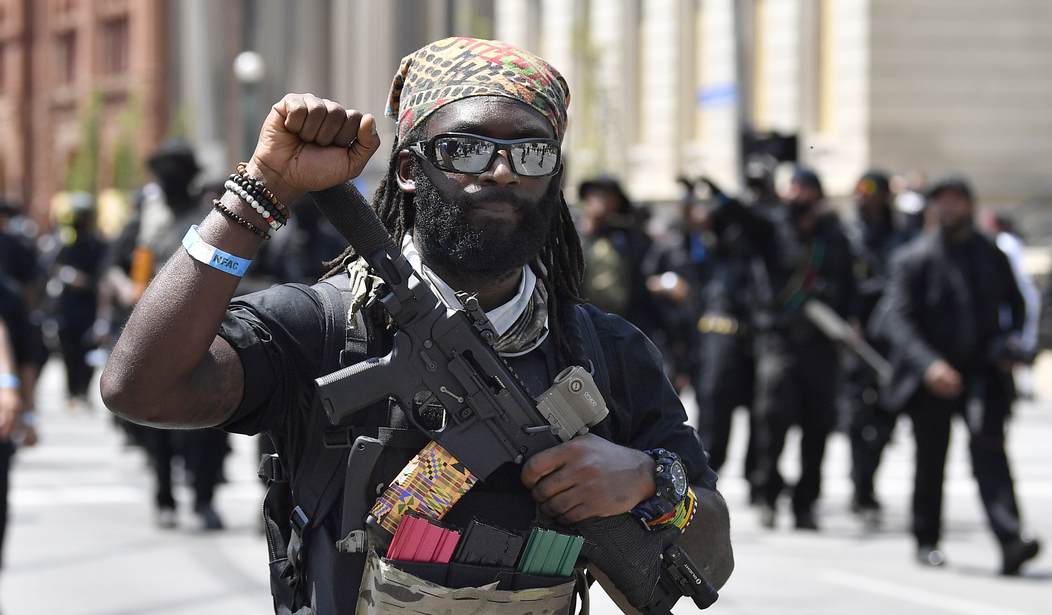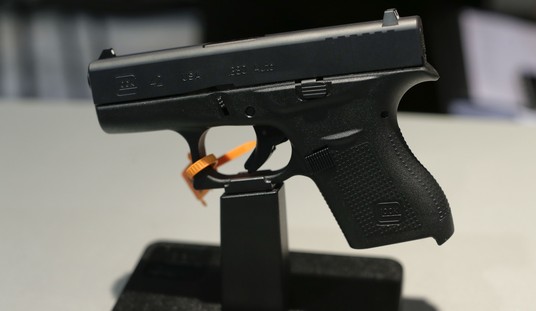That’s the argument by Justin McFarlin, a member of Everytown for Gun Safety’s Veteran Advisory Council, who opines in a guest column at USA Today that, although he’s an NRA certified firearms instructor and a concealed carry holder, he’s too afraid to carry a gun in public because of the color of his skin.
I believe in the Second Amendment, but I won’t even consider carrying a firearm openly in public. I haven’t exercised my right to carry a concealed handgun in more than four years.
The reason: I am Black.
It has become clear to me that open carry and concealed carry are white privileges — permit or not. Despite having a license: I am afraid of being killed by police if I carry a gun in public.
I have good reason to be afraid. In 2016 in Minnesota, a Black school cafeteria worker named Philando Castile was killed during a routine traffic stop after merely mentioning the fact that he was legally in possession of a concealed firearm. Tamir Rice, a 12-year old Black boy in an open-carry state, was murdered by officers in just seconds for holding a toy gun. John Crawford III was murdered in a Walmart holding a BB gun that was for sale in the store.
There are too many more to mention.
I’m not going to lecture McFarlin on why he’s wrong to feel the way he does. As a 40-something year old white guy, I don’t know what it’s like to carry a gun as a black man, so it would be awfully presumptuous of me to try to tell McFarlin how to feel.
I do have some questions, however, starting with this one: does he actually feel any safer when it comes to contact with police if he’s unarmed? After all, we can also find examples of unarmed black men and women who’ve been killed by police. In fact, USA Today reports that there were at least 14 such deaths in 2019. Is McFarlin’s fear really about whether or not he carries a gun, or are his fears fundamentally about the interactions between black men like himself and law enforcement in general?
McFarlane actually spends most of his column space railing against the presence of armed protesters across the country. Well, some of them anyway.
Increasingly, white protesters use open carry not just as an expression of privilege, but as a way to intimidate Black Americans. At a neo-Nazi rally in Charlottesville, at protests against the removal of Confederate statues, and at racial justice counter-protests, guns have been used as an implicit symbol of white supremacy.
That was on clear display when a St. Louis couple threatened Black Lives Matter protesters with an AR-15 and a pistol, and despite being charged with felonies, they were featured speakers at the Republican National Convention.
Day after day, the country that was founded on the words “All men are created equal” demonstrates that white citizens may carry firearms in protest, while Black citizens have limited rights to protest at all.
McFarlane ignores the hundreds of black gun owners who assembled to protest in Louisville, Kentucky this past weekend, as well as the armed black protesters in Richmond, Virginia who stood guard at the statue of Robert E. Lee that became the focal point of Black Lives Matter protests this summer.
He also fails to mention the armed black men and women who have rallied and protested at the state capitol in Lansing, Michigan on multiple occasions this year, though he does bring up a group of mostly white protesters who brought guns to the state capitol.
In fact, McFarlin uses the lockdown protests in Lansing as his prime example of why he believes the answers is more gun control laws.
This country has a long road ahead in the fight for racial justice, but when it comes to open carry, we can take action sooner. States must prohibit firearms at demonstrations held on public property or at capitol buildings. If you want to protest, bring signs, not guns.
Weak open carry laws should never be used to enable armed intimidation or suppression of the constitutional right to assemble and peacefully protest. More states should follow the example of the handful that already regulate the open carry of firearms in public, by prohibiting it or requiring a license. And where we have these laws, they must be equally enforced.
I carried a firearm on behalf of this country in uniform. But I can’t feel safe carrying my own firearms here at home. Something must change.
There’s a lot that needs to change, starting with the gun control laws and cultural taboos that have de-normalized gun ownership for black Americans. We need to recognize the role that armed self-defense has played in the civil rights movement, from Harriet Tubman, Ida Wells, Ossian Sweet, Martin Luther King, Jr. and Fannie Lou Hamer (to name just a few of the more famous black Americans who exercised their Second Amendment rights).
We don’t even have to look back in history. McFarlin could support the efforts of black gun owners like Maj Toure, Kevin Dixie, Colion Noir, Michael Cargill, Rick Ector, Killer Mike, and many others who are actively working to ensure that the Second Amendment is a right of every law-abiding American.
We also need to get rid of may-issue gun licensing laws that can prevent black Americans from legally owning and carrying a gun, as well as lead to disparate outcomes in terms of arrests. McFarlin doesn’t say a word about the stop-and-frisk tactics used by Everytown founder Michael Bloomberg, for instance, or Bloomberg’s comments about addressing “gun violence” by taking young black men and “throwing them against the wall” to pat them down for weapons.
If McFarlin is serious about wanting the Second Amendment to apply equally to all Americans, he’s on the wrong team. It’s not the Second Amendment that’s enabled discrimination against black gun owners, it’s the gun control laws put in place by groups like Everytown for Gun Safety. McFarlin won’t feel any safer carrying his firearms if gun control activists get their way. In fact, he likely wouldn’t be allowed to carry at all.
The Second Amendment isn’t about white privilege, but a right of the People to keep and bear arms. If McFarlin believes that the promise of the Second Amendment has yet to be fully and equally applied, I believe the answer is to fight for the full exercise of that right by all Americans, not to embrace the idea of turning the right into a privilege.








Join the conversation as a VIP Member